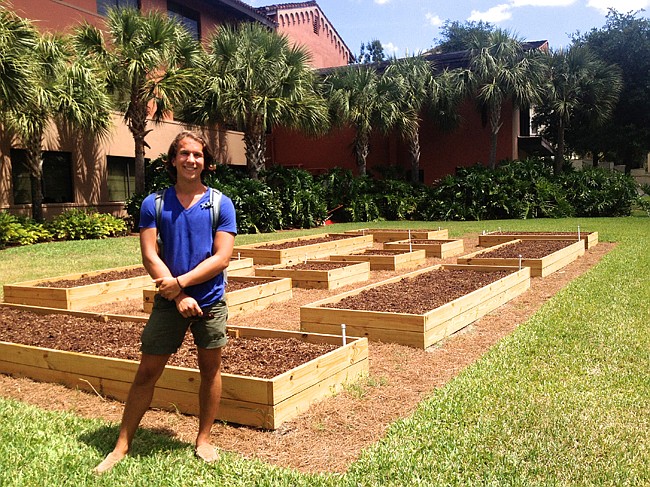- April 25, 2024
-
-
Loading

Loading

The green-yellow water hose kinks with every turn that Andrew Lesmes takes around the raised garden beds. Beads of sweat form on his forehead as he works along the pine-strewn walkway from one bed of germinating lettuce to another. It’s a warm Florida day, but Lesmes barely notices. That kind of persistence helped him create this unprecedented community garden on the Rollins campus.
An Environmental Studies major at Rollins College, Lesmes has a knack for turning what is now just piles of mushroom compost from Lakeland County into beds of fresh romaine, red oak leaf, Simpson and other lettuce varieties. Lesmes has a passion for sustainable agriculture and wants people to know just how feasible it is.
The idea of a campus garden stemmed from a visit to Rollins by “An Inconvenient Truth” producer and environmental activist Laurie David. Lee Lines, environmental studies professor at Rollins, said that Laurie David asked Lesmes and other students over lunch, “So, where’s the garden on your campus?” That’s when Lesmes decided to take an independent study in his last year in college to create a vegetable garden accessible to students.
He began working his own yard along with his studies, now boasting three raised garden beds after six years cultivating his own experience.
“I’ve always wanted to have those practical skills to back up the academic experience that I’ve had,” Lesmes said.
The eleven raised beds at Rollins are still in their infancy, having been built in the last week of March. Planning began back in August, but the project took almost two semesters with designing the garden, writing the proposal, meeting with contractors, and handling the negotiations. Lesmes said getting the school and the community to rally behind him was key to helping his idea bloom into reality.
“The fact that it’s done in one and a half semesters is still pretty miraculous,” Lesmes said.
Lines said that Lesmes’ passion carried the project forward. The Rollins administration also played a key role by providing a $4,000 grant to fund it.
“It’s really great to have an administration so supportive of a student initiative,” Lines said. “It’s been a team effort from the top down.”
Lesmes hopes for the Rollins garden to be just the beginning of local gardens budding at other schools. The nonprofit IDEAS For Us has a school chapter at Winter Park High School, with students there planning their own campus garden. Chris Castro, co-founder and executive vice president of IDEAS For Us, said liability issues will keep the produce from being used in the cafeteria, but it will be given to the garden’s student volunteers instead. EcoRollins, an environmental activism organization at Rollins, is helping the high school’s garden to get off the ground.
“It’s really cool that EcoRollins is interested in partnering with [Winter Park’s] initiative as well,” Castro said.
One of the benefits of locally sourced food, Lesmes said, is that it is highly affordable. The cost of all the compost, a byproduct of mushroom farming, was $150.
“Financially, it’s surprisingly minimal to do this sort of thing. Someone could build beds for themselves on a budget of less than $500 — enough to produce food for themselves almost completely,” Lesmes shared.
When Lesmes brainstormed the project last fall with John Rife, owner of East End Market, they came up with a $4,000 budget for the project from start to finish. Lesmes was amazed that they barely exceeded that goal, spending about $200 extra.
“I think the bigger obstacle than the financial one is that people don’t think they can do it. In the case of college students, in a lot of ways, they can’t do it because they’re living in dorms and they don’t have the resources,” Lesmes said.
The Rollins senior said that one of his primary hopes is to give students the opportunity to do all the hands-on work.
“Volunteers are contributing to something tangible in that the produce will be going directly into the main places they’re dining: the main cafeteria of the campus,” Lesmes said.
Lesmes said about 60 percent of the produce will be for on-campus dining, and the rest will be sold to Hamilton’s Kitchen — the fine dining restaurant at the Alfond Inn across from Rollins.
“The chefs there have been very interested in the beginning. [The Alfond Inn] is owned by Rollins so it’s very logical to use them as first chefs,” Lesmes said.
Lines explained some of the plans for the garden in the future, such as bringing his “Hidden Landscapes of Food in America” course to help tend it.
Lines expects the garden to hit its stride in the fall, when some of the garden beds will be associated with classes doing experiments. One of those projects will be for students to trace the origins of a meal from their plate back to the farm.
Lesmes hopes to plant sweet corn in one of the longer beds in addition to the heirloom tomatoes, kale, and lettuce, turning one corner of the Rollins College into an edible landscape.
Lesmes looks down at the soil in the closest bed to Elizabeth Hall, and notices something sprouting through the earth.
“There’s some of the red oak leaf just starting to get its pigment,” Lesmes said.
Post-graduation, the young entrepreneur will be doing an apprenticeship at a small, family-run organic farm in Maine, but he still plans to be involved in the Rollins garden’s progress. Lesmes said he’s confident in the students he’s passing the garden to, helping to bring the garden to full bloom.